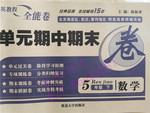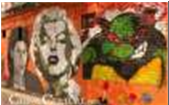题目内容
5.What is politeness?This sounds like a simple question.In daily life,we often make judgments about what is polite and what is not polite.For example,to offer your seat to the elderly on a bus is considered polite behavior,and to interrupt when someone is talking is considered impolite; to greet someone the first time you meet him in the morning is polite and to stand up to reach for the dish you want at a dinner table is impolite.So politeness can first of all be regarded as a phenomenon,an observable social phenomenon.What I would like to propose is that as an observable social phenomenon,politeness is something superficial,but to account for what is understood at the surface,we should dig into the depth where different cultural values are rooted.
When being complimented (赞美),an English-speaking person would readily accept the compliment by saying something like"Thank you"to show his appreciation of the praise,but a Chinese speaker would try to deny the truth of the compliment.They both think they are behaving properly.Yet neither of them would think the other is being polite.The English speaker is being polite to the extent that by accepting and showing appreciation of the compliment,and he avoids hurting the positive face of the person who makes it; the Chinese speaker is showing modesty by Denigrating(贬低) himself,ignoring the fact of the compliment paid to him.As has been mentioned,self-denigration has been at the core of the Chinese understanding of politeness for over two thousand years.The Chinese,in order to show modesty,will go to such lengths as to underrate what he himself has achieved and deny the truth of a complimentary remark.
29.According to the first paragraph,politeness can be briefly described asD
A.proper social phenomena
B.being modest
C.showing appreciation
D.an observable social phenomenon
30.In the author's opinion,the nature of politeness lies inC.
A.something superficial
B.what is understood at the surface
C.different cultural values
D.the root of different thoughts
31.Which of the following is TRUE?C
A.Chinese speakers dislike being complimented.
B.English-speaking people are reluctant to accept compliment.
C.Chinese tend to show politeness and modesty by denying the truth of praise.
D.Chinese people think highly of British politeness while English people think poorly of Chinese politeness.
32.What's the author's attitude towards Chinese politeness?A
A.Objective.
B.Critical.
C.Optimistic.
D.Approving.
分析 礼貌具有明显的文化特征.中国式礼貌的最大特点是"夫礼者,自卑而尊人".现在这个礼貌准则中"卑"的成分逐渐被"自贬"和"自谦"取代.那么西方人的礼貌特点是怎么体现的呢?
解答 DCCA
29 D 细节题.根据文中第一段的最后一句"So politeness can first of all be regarded as a phenomenon,an observable social phenomenon"可知,D项符合题意,故正确答案为D.
30 C 细节题.根据文中第二段"politeness is something superficial,but to account for what is understood at the surface,we would dig into the depth where different cultural values are rooted"可知,礼貌的本质在于"different cultural values",故正确答案为C.
31 C 细节题.根据第三段"…but a Chinese speaker would try to deny the truth of the compliment.They both think they are behaving properly"可知,C项符合题意;A项,中国人为了表示谦虚才会"ignoring the fact of the compliment paid to him",这并不说明中国人不喜欢被称赞,所以A项错误;B项,be reluctant to…表达"不情愿…",由原文可知,"English-speaking people would readily accept the compliment",所以B项错误;D项,根据原文"…Yet neither of them would think the other is being polite"可知,D项不符合原文,所以D项错误.故正确答案为C.
32 A 推断题.根据第三段段末内容可知,作者只是客观陈述中国人价值观里的礼貌,并无 critical"批判的"、optimistic"乐观的"、approving"赞成的,满意的"之意,故正确答案为A.
点评 考察学生的细节理解和推理判断能力,做细节理解题时一定要找到文章中的原句,和题干进行比较,再做出正确的选择.在做推理判断题不要以个人的主观想象代替文章的事实,要根据文章事实进行合乎逻辑的推理判断.

 单元期中期末卷系列答案
单元期中期末卷系列答案---____________.( )
| A. | Yes,go ahead | B. | No,please don't | ||
| C. | Go ahead,please | D. | Certainly,do as you please |
I had just put on my suit,shorts,and tank top(无袖紧身背心),and packed my bag with sunscreen and (38)Aelse I would need for the day.I ran into my parents'room to find Dad.When I saw him on the phone,he was crying.I'd never seen my dad cry before.My heart(39)A.what possibly could have happened?
"Max,I'm so sorry,"I heard him say.That's when it(40)Bme.I knew that Suzie had died.Max has been my dad's best friend for years.Suzie,his daughter,had a rare disease that mainly affected her body.Her brain was OK.She knew what was (41)B; she knew that she had problems and was different from other kids.Once she told her dad that she wished she could die and be born in a different body.Yet although she couldn't live a normal life,she was still happy.
When Suzie and I were little,we spent quite a bit of time together.As we grew up,we grew(42)C.She lived in New York,and I lived in the Midwest.When Suzie was ten,she had to live in a(43)Din Virginia.About eight months before she died,Max gave us her number at the hospital and we talked on the phone at least twice a week(44)Athe end.In a way,she lived through me.After we found out about her(45)D,we made our plans to go to New York for the funeral.When she was alive,I sent her a Beanie Baby and she sent one back to me.I had(46)Dher another one but never had the chance to send it to her,so I took it to put in her casket(棺材).
To be honest,I learned so much from her.She gave me far more than I could ever give to her.I will never forget her or the talks we had.I now know that I must never (47)Banything for granted,especially my health and the gift of life.
| 36.A.when | B.after | C.once | D.while |
| 37.A.glaring | B.gorgeous | C.glamorous | D.gloomy |
| 38.A.anything | B.something | C.everything | D.nothing |
| 39.A.sank | B.dropped | C.fell | D.lowered |
| 40.A.surprised | B.hit | C.attracted | D.beat |
| 41.A.getting on | B.going on | C.working on | D.running on |
| 42.A.tall | B.strong | C.apart | D.pretty |
| 43.A.kindergarten | B.nursery | C.clinic | D.hospital |
| 44.A.until | B.in | C.since | D.by |
| 45.A.condition | B.survival | C.situation | D.death |
| 46.A.borrowed | B.made | C.bought | D.sew |
| 47.A.get | B.take | C.enjoy | D.own. |
 Almost anywhere in the world,you can probably see graffiti (涂鸦画).Although it's usually more common in big cities,it can be found in almost any community,big or small.
Almost anywhere in the world,you can probably see graffiti (涂鸦画).Although it's usually more common in big cities,it can be found in almost any community,big or small.